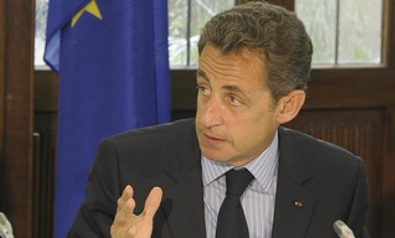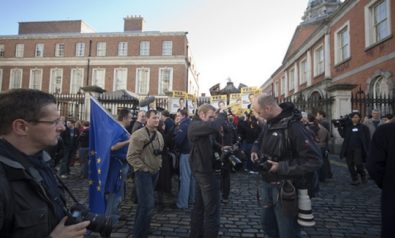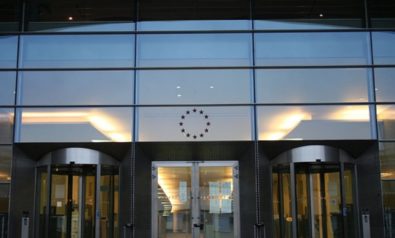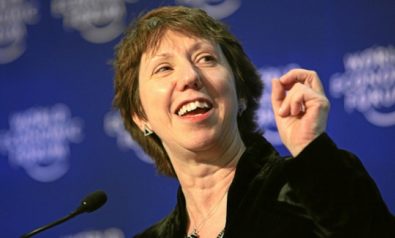A historical overview of the CFSP.
A vision for a collective geopolitical role for an integrated Europe was first articulated in the early 1970s, under the notion of Europe as a global civilian power. In light of the first enlargement round of the European Community to include Denmark, Ireland, and the UK in 1973 and the superpower rivalry of the Cold War, Europe was envisioned to become an influential, but more peaceful and civilian actor in world politics. However, around the same time, the Norwegian intellectual Johan Galtung warned of a collective Europe developing imperial ambition similar to those of its member states in the first half of the twentieth century. Galtung viewed European integration as an attempt “take five broken empires, add a sixth one later [Britain], and make one big neo-colonial empire out of it all”.
Twenty years later, when the European Community became the first pillar of the European Union in 1993, a collective foreign policy approach was officially anchored in the Treaty of Maastricht as the second pillar of the EU: the Common Foreign and Security Policy (CFSP). It was an attempt to streamline the foreign policies of the then- twelve member states, albeit retaining an intergovernmental character. This idea of a common foreign and security policy, not as a formal geopolitical framework, but as a practice of collective external relations, emerged much earlier. As a result of the discourses and practices of integration in the 1970s, the first attempts to harmonize foreign policy started to emerge in the form of the European Political Cooperation (EPC). According to Wolfgang Wessels, the EPC injected a ‘coordination reflex’ into the diplomatic behaviour of EC member states so that national policy positions were increasingly developed only after having consulted with European partners. Initial agreements were signed by the then six member states of the European Community in October 1970 and subsequently built upon and intensified over the following years, including the newly acceded members in 1973. As early as 1976, in consideration of the Tindemans report, the then nine foreign ministers of the EC noted that “European Political Cooperation must ultimately lead to a common foreign policy”. The EPC was thus a precursor to the CFSP with the general aim to “put the Nine into a position whereby they can speak with one voice on international questions,” according to Wessels. Clearly these processes have evolved considerably since the 1970s; however, they laid the foundation for the institutionalised processes of current harmonisation of European external relations. In the wide literature on foreign policy Europeanization, the coordination reflex, first pointed out in the 1970s, is often described as a “reflexe communautaire [that has] become the norm rather than the exception,” according to Reuben Wong.
The CFSP as a policy framework was inextricably associated with the name of Javier Solana, the EU’s High Representative for the Common Foreign and Security Policy from 1999-2009. Solana, a former Spanish foreign minister and NATO Secretary-General, gave the CFSP a prominent face and shaped the collective approach of EU external relations like few others. His limited mandate, though, restricted a more effective and coherent ‘one’ European voice in the world. Officially, Solana’s role was to act on behalf of the European Council (the intergovernmental body composed of representatives of the member states) on matters of foreign affairs, but the position lacked a mandate from the European Commission (the Commission’s head of external relations was the Commissioner for External Relations). He was thus often stuck between representing a collective position of the member states – if there was one – and not touching on the Commission’s external portfolio.
This impasse ended – at least formally – when the pillar structure of the EU was replaced with the Treaty of Lisbon in December 2009. The Treaty provided for the creation of the post of the High Representative (HR) of the Union for Foreign Affairs and Security Policy, serving simultaneously as First Vice-President of the European Commission. The position combined the former posts of High Representative for the Common Foreign and Security Policy and European Commissioner for External Relations, thus holding a joint mandate of both the Council and the Commission and – at least theoretically – authorizing the HR as the spokesperson for all collective external action of the Union. Simultaneously, the Lisbon Treaty also created the European External Action Service (EEAS) as a supporting diplomatic corps for the HR. As part of the EEAS, the 130 Commission delegations around the world were also transformed into delegations of the European Union with the mandate to represent the Union on behalf of both the Council and the Commission. Their competencies and authorities were thus extended from a technical role of implementing Commission policies to also include political-diplomatic functions representing the European Union.
The Lisbon Treaty thus laid the structural conditions for a more collective geopolitical role of the EU. However, the seemingly Euro-fatigued political elites in the member states appear reluctant to support it. The traditional British Euro-scepticism did certainly not come as a surprise under David Cameron’s Tory government; additionally, though, the Franco-German engine seems to be stalling increasingly with Angela Merkel and Nicolas Sarkozy quibbling over the drivers’ seat – and both appearing to prioritize national interests over collective European visions. The shared conservative orientation of those leaders might be more of a co-incidence, in particular in the German case in which the conservative party, Merkel’s (and Kohl’s and Adenauer’s) CDU has traditionally been a very pro-European voice. However, the apparent Euro-sceptic shift amongst Europe’s conservative parties might be indicative of nationalist tendencies in a range of European countries, fuelled by a growing xenophobia in parts of the population that the conservative parties appear to be stoking in their search for votes.
Moreover, the choice of Catherine Ashton as the HR has to be seen in this light. Ashton’s nomination for the post has been disputable – to say the least. It was seemingly dominated by political quarrels between the heads of government to find a candidate that fulfils a range of quotas, such as party affiliation, gender, large/small member states, and so forth. The choice of a relatively inexperienced British labour back bencher, on the top diplomatic post as first office holder, defining and crafting the role and function of that crucial post, reflects a certain Euro-malaise amongst current European leaders. The best Europeans, as recently remarked by Piotr Busak in the German weekly Die Zeit, are to be found in Warsaw nowadays.
Nevertheless, the ambition to play a more collective geopolitical role has received renewed impetus through the Lisbon Treaty whereby EU external relations reflect the internal levels of integration in many ways – both in economic and political terms. Economically, the EU is relatively integrated. Various economic steps of integration have mostly preceded political steps. Internally, this resulted in the common market – now constituting the largest integrated economy in the world. Externally, it takes the form of the Commission’s far-reaching competencies in external trade policy. Politically, however, the EU is much less integrated, both internally and externally. Just as there are multiple layers and levels of government and governance within the EU, external relations are also conducted through multiple actors, i.e. the Commission, the EEAS, the member states, etc., that do not always pursue the same interest or follow the same policies.
This political fragmentation is clearly a limit to a more (pro)active geopolitical role of the EU, yet it is also indicative its chosen motto: ‘unity in diversity’. It is precisely this type of co-existence and deep interaction between different peoples and cultures, whilst respecting the differences, that is appealing. The idea of creating a ‘mosaic,’ as opposed to a ‘melting pot,’ (to use North American metaphors) of different traditions and cultures is fundamental to the integration process and was elemental for a continent marked by centuries of most sophisticated warfare to be transformed into an area of relative peace and prosperity. In a related commentary, Heribert Prantl recently wrote in the Süddeutsche Zeitung:
Europe is the realization of so many old peace agreements that did not end up bringing peace. The European Union is the end of almost thousand years of warfare of almost everyone against almost everyone. It is the undeserved paradise for the people of a whole continent. EU stands for the golden age of European history.
It is from this development that Europe draws a substantial appeal to other regions in the world as a geopolitical model for peaceful regional integration. However, Europe’s global role is predominantly recognized in the economic sphere where the EU exercises significant influence through the Commission as the collective authority over the common market and the external trade policy. Geo-economically, the EU is a key global actor with considerable power to shape the structures, processes and flows of the world economy. Yet, in particular towards developing countries this is often perceived as neo-imperial. It is a common perception that the EU exploits globalization for the benefit of European companies, thereby side-lining local products that are not able to compete on their domestic market (let alone world market) with the subsidized and highly advanced commodities from the European economies. The appeal of Europe’s geopolitical model of peaceful co-existence and regional integration is therefore undermined by perceptions of Europe’s geo-economic imperialism, described by Hooper and Kramsch as ‘Europe’s flourishing neo-colonialist political economy’.
Clearly, the CFSP and the EEAS are not necessarily means of projecting imperial power, however, they are part of a larger European influence in the world. Particularly in developing countries the colonial period still looms large in this context. This may or may not be justifiable, but it is essential for Europeans to understand that these perceptions persist. A more sensitive and consultative conduct of external relations with developing countries, taking into consideration their interests and expectations, might contribute to dispelling such perceptions.
Moreover, a more reticent geopolitical role does not mean the failure of the European project. The initial objective of European integration was not exercising global hegemonic leadership – in fact, in light of Europe’s colonial history, this very well should not be the objective of a normative Europe – but instead, overcoming war and creating peace and prosperity. In this respect the European integration process has been remarkably successful. Nowadays, most Europeans take this for granted. This is not to deny the problems the EU currently faces and is also partly responsible for, i.e. erosion of the social welfare state, the crisis of the Euro, democratic deficit, etc., however, the EU’s performance to act as a powerful geopolitical actor cannot be the key criteria to judge the European integration process.
Instead, the model character of the EU should be critically evaluated. Clearly, a key lesson is to be learnt in this context, namely ‘how enemies can become neighbours,’ according to Ulrich Beck and Edgar Grande. Internally these considerable achievements should be acknowledged and valued. Also externally, these experiences could potentially serve as guidelines and examples for regional integration and civilian spaces of interaction. However, this does not automatically entail the legitimization of imposing its model on other world regions; an active external promotion should be dependent on the desire and request of the EU’s external cooperation partners. In 1992, Jürgen Habermas argued that in contrast to previous empires, “Europe as a whole is being given a second chance” to influence world history; this time “under changed premises, namely a non-imperial process of reaching understanding with, and learning from, other cultures”.
Indeed, Europe’s geopolitical influence can only come through appeal, not through power. An occasionally incoherent CFSP is not a failure in this context – a possible plurality of opinions and positions is rather an intrinsic part of what defines the European mosaic. Europe has had a long imperial past (and present?), it certainly does not need an imperial future.
Support Fair Observer
We rely on your support for our independence, diversity and quality.
For more than 10 years, Fair Observer has been free, fair and independent. No billionaire owns us, no advertisers control us. We are a reader-supported nonprofit. Unlike many other publications, we keep our content free for readers regardless of where they live or whether they can afford to pay. We have no paywalls and no ads.
In the post-truth era of fake news, echo chambers and filter bubbles, we publish a plurality of perspectives from around the world. Anyone can publish with us, but everyone goes through a rigorous editorial process. So, you get fact-checked, well-reasoned content instead of noise.
We publish 2,500+ voices from 90+ countries. We also conduct education and training programs
on subjects ranging from digital media and journalism to writing and critical thinking. This
doesn’t come cheap. Servers, editors, trainers and web developers cost
money.
Please consider supporting us on a regular basis as a recurring donor or a
sustaining member.
Will you support FO’s journalism?
We rely on your support for our independence, diversity and quality.












Comment